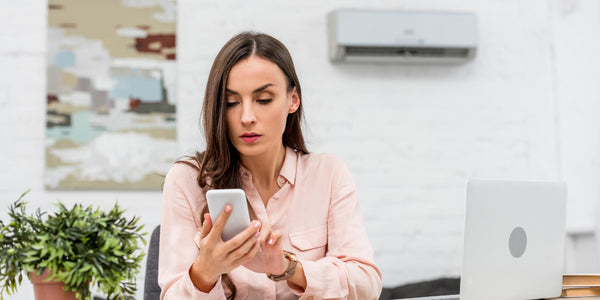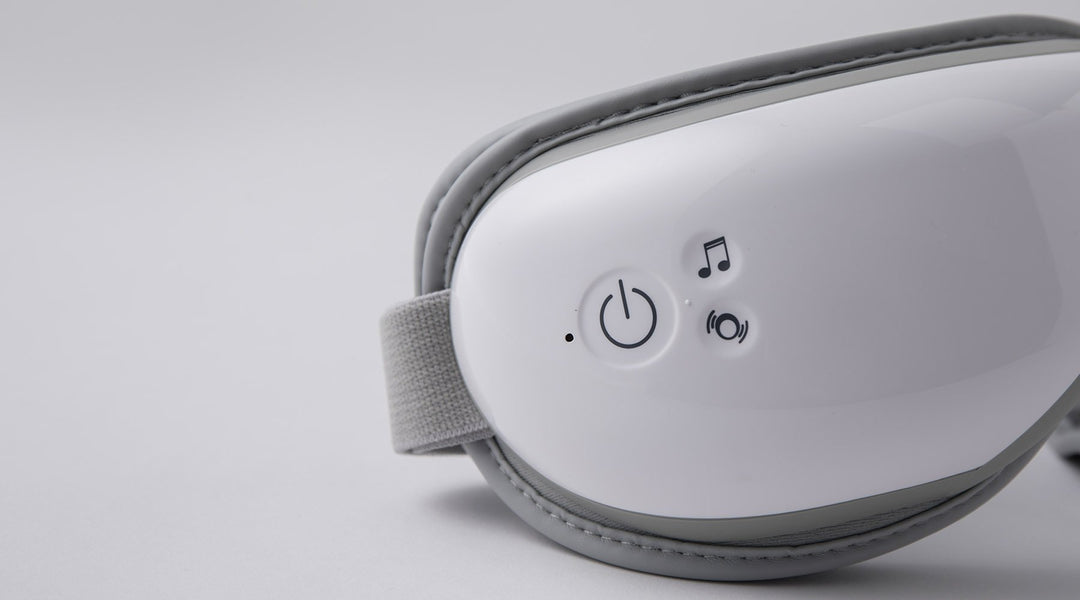We use our smartphones and computers for almost everything–whether it’s for work, communications with family and friends, or just want to catch up on social media. Have you ever noticed how the muscles around the eyes tend to stiffen, or your eyes start to dry up and vision becomes blurry after using your gadgets for a long period? That’s what we call eye strain.
Too much screen time has various harmful impacts on our health, such as poor sleep quality and attention span. The good thing is, that there are ways we can use our smartphones the right way to help prevent digital eye strain and other health problems. Learn more about these and how you can incorporate the RENPHO True View Eye Massager for eye relief!
Why Do Digital Screens Cause Eye Strain?
The brightness of screens of digital devices, its glare and flashing can strain your eyes. The intense blue light that digital screens produce penetrates the eye more deeply.
Moreover, we typically blink about 15 to 20 times every minute to help distribute tears over our eyes equally, preventing dryness and other irritation. When we focus too much on reading or watching on the screen, we blink less than half as frequently.
Why Can’t You Put Your Phone Away?

If you feel like you hardly ever look away from your smartphone these days, you’re not alone! Some studies have shown that it’s because our brains are programmed to prioritize mobile devices.
Researchers discovered that smartphones have the same chemical reaction in the brain as drugs and alcohol. Getting “likes” and updates from your device releases dopamine, which causes us to feel good, and in turn, we want to repeat these feel-good behaviors.
We establish an obsessive and never-ending cycle where we glance at our phone continuously to feel better, but when we don’t get likes or alerts, we feel frustrated and lonely, resulting in a negative effect.
The Impact of Too Much Screen Time on Your Brain and Overall Health
Excessively spending time using your digital gadgets can be dangerous, and here are several ways it may be harmful to your health:
How It Impacts Your Sleep Quality
Lights from electronic devices disrupt the brain’s sleep hygiene and can make it difficult to achieve a restful night of sleep.
Studies have shown a direct correlation between the amount of time you spend staring at a screen and the quantity and quality of your sleep. It’s not simply because you want to check social media or get disturbed by notifications (although this happens, too).
As you attempt to go asleep, your brain is fighting to be awake. Unfortunately, the more exhausted you are, the more energy you will probably spend watching television the following day.
How It Impacts Your Concentration and Attention Span
Focus has previously been demonstrated as one of the negative effects of our gadgets. We check our phones every 12 minutes when awake, and studies have shown that even just having a phone nearby can impair our focus.
However, when we use our devices, especially online, we enter a space that isn't designed for focused work or undivided attention. It is challenging to fully commit to a task when advertising, notifications, and popups are constantly interfering.
One study found that it takes 23 minutes for one to regain full concentration following an interruption. This merely proves that none of us is ever actually paying attention.
How It Impacts Your Mood and Mental Health
Experts say that increased screen time and depression are possible to be linked, as well as an increase in harmful behavior and tendencies and a general decrease in one’s capacity to read emotions.
Higher screen exposure is generally related to lower levels of mental well-being. Even though this has primarily been observed in children, older users can also experience this. It is a major risk factor or an indicator of mental illnesses. An increase in screen time is related to depression, anxiety, and low self-esteem problems, which is a significant issue.
Issues including decreased curiosity, trouble forming relationships, and a lack of self-control and mental stability develop as a result of the overuse of video games, television and internet-connected devices.
Digital eye strain can occur with different symptoms such as:
- You feel your eyes itching or watering
- Your eyes hurt or are drowsy
- You’re having blurred vision or double vision
- Your eye feels dry or sore
- You experience migraine or headaches
Tips to Help Protect Your Eye From Too Much Screen Time

You don’t have to stop using your gadgets entirely, but you can make a few adjustments to how you use your device to prevent digital eye strain.
- Pay attention to what you eat
Your heart, eyes and vision will benefit from eating foods that promote circulation. Pick heart-healthy foods such as whole grains, citrus fruits and dark leafy greens. Lean red meat, chicken, beans, peas, peanuts, oysters and other foods high in zinc can protect the eyes from light-related damage, such as your digital screen's blue light. Carrots are also healthy for your eyes since they contain vitamin A, which is necessary for clear vision.
Beta-carotene, which is present in many yellow or orange fruits and vegetables, as well as lutein and zeaxanthin, are additional nutrients that benefit the eyes.
- Put more space between yourself and your computer or phone screen.
Make sure your device is an arm’s length away from your face, or about 25 inches. The screen’s center should be positioned 10 to 15 degrees below eye level.
The recommended distance between a digital screen and a person is 25 inches or roughly the length of a person’s arm from the eyes. Also, adjust the screen’s brightness so that you can read the text comfortably without getting tired.
- Follow the 20-20-20 rule
The 20-20-20 rule states that you should spend at least 20 seconds every 20 minutes gazing at an object that is not your gadget. Your eyes won’t be damaged from staring at a digital screen, but they could get tired and dry.
Observe the 20-20-20 rule: every 20 minutes, take a minimum of 20 seconds to look at least 20 feet away or stare at a distant object. Moreover, set your screen about 25 inches away and a little below eye level. Move light sources or apply a screen filter to reduce screen glare. Remembering to blink can avoid dry eyes by promoting tear production.
- Keep your eyes moist
Use eye drops and antihistamines or do a cold compress to calm itchy or red eyes. Saline eye rinses should be used if you have gritty sensations or sand in your eyes. If symptoms persist or if you experience eye pain, secretions, puffiness or sensitivity to light, consult a doctor. Flashes of light, dark floating patches or you cannot see your surroundings clearly are additional causes to visit a doctor.
- Let your eyes rest
After every 2 hours of using your smartphones, take a long break for about 15 minutes, so your eyes can rest.
Take frequent breaks during working hours to lower your chance of developing eye strain and back, shoulders and neck pain. To relieve any tension and muscle stiffness, during these pauses, stand up, move around and stretch your body.
Rest your eyes with the RENPHO True View Eye Massager, which includes stimulating massage modes that make use of pressure points on the cheekbones, eyeballs, brows and temples to help relax the eyes muscles and relieve eye fatigue.
- Have regular eye checkups
Uncorrected vision issues are a major source of digital eye strain. Comprehensive eye exams will make sure that any changes in your vision are promptly addressed. It is always best to consult your doctor if you frequently experience severe symptoms of eye strain.
We live in an era where digital screens play a role in our daily lives, and it makes sense that your eyes will eventually be tired. You’ll surely avoid straining your eyes by changing how you use your gadget. During a hectic day at work, using the RENPHO Eye Spa Pods can help your eyes relax and be refreshed!
Now is an excellent time to establish some rules for yourself for better eye health!
Renpho Health Tips
-

Why You Need An Eye Massager in 2020
Jul 09, 2020
Read more >
-

What Are The Benefits of a Massage Gun?
Aug 03, 2020
Read more >
-

5 Best Foot Massager Benefits
Jul 09, 2020
Read more >
-

How to Pair the RENPHO Smart Body Fat Scale to the RENPHO Health App
Jun 24, 2021
Read more >
-

Renpho Seasonal Staff Picks 2021
Dec 05, 2021
Read more >
